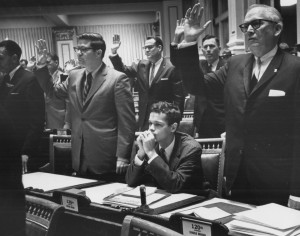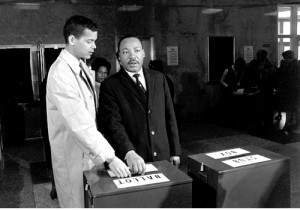Last night, people were saddened to learn of the passing of Civil Rights icon Julian Bond. The son of Horace Mann Bond (a scholar and educator who’s also an important person for intellectual historians to know about), Julian Bond personified the Civil Rights Movement, and more broadly, the history of the twentieth century iteration of the Black Freedom Struggle. His death will leave a gaping hole in national leadership on the question of civil and human rights in American society. As historians, we need to recognize the many ways he led during his long—although it feels like it wasn’t long enough—life.
As I mentioned above, Bond’s life is a spectacular representation of the African American experience. As a young boy and the son of a college president, Bond had the fortune of meeting figures such as W.E.B. Dubois and Paul Robeson early in his life. Bond’s life is an immediate reminder of the importance of Historical Black Colleges and Universities to American history, and to American intellectual history more specifically—not only did Bond grow up in an HBCU environment, but his attending of Morehouse College during the height of the Civil Rights Movement put him on the intellectual and physical front  lines of the fight against racism and segregation.
lines of the fight against racism and segregation.
Bond was also early to the anti-Vietnam War movement. Again, Bond’s own intellectual trajectory was a window into radical intellectual traditions. Attending a Quaker high school, Bond learned about pacifism and took those lessons with him into the Civil Rights and anti-Vietnam War movements. His outspoken opposition to the war cost Bond his Georgia House of Representatives seat in 1966; eventually the Supreme Court would rule, 9-0, that his First Amendment rights had been infringed upon by the Georgia State Assembly, and he was allowed to finally take his seat. During this time Bond would author a comic book, which summed up the many reasons given by a wide variety of activists and politicians on the unnecessary and immoral need for American intervention in Vietnam.
His trajectory from scion of African American educators (his mother Julia Agnes was a librarian), to civil rights activist, to state politician resembled the larger African American experience of the twentieth century. And as Bond’s life continued, he never stopped being an exemplar of African American achievement and intellect. He taught at several universities and authored books. Bond served as a Georgia state representative and senator for twenty years, before losing a controversial Democratic primary race for U.S. Congress seat to John Lewis—a race that included accusations of drug use against Bond and was an ugly episode in the post-Civil Rights Movement legacy of two icons. A consummate Southerner who worked his entire life to change the South, and the nation, into a better place, Bond was a founder of the Institute for Southern Studies in 1970, and later led the Southern Poverty Law Center from 1971 until 1979. He served as Chairman of the NAACP from 1998 until 2009, and also wrote a syndicated newspaper column, Viewpoint, as well as hosted seventeen seasons of the political commentary show, America’s Black Forum. In a variety of ways, Bond participated in the modern public sphere of newspapers and television– even guest hosting Saturday Night Live on April 9, 1977, an appearance best remembered for this skit with Garrett Morris concerning skin color and the African American community.
As a subject for intellectual historians, Bond should be seen as a figure who attempted to find different avenues through which he could aid African Americans. Bond, like John Lewis and other figures, truly lived the “protest to politics” agenda set forth by Bayard Rustin’s 1965 Commentary essay. Julian Bond’s teaching as a historian of the Civil Rights Movement bears consideration by historians, as he operated as both scholar and movement veteran when helping to shape civil rights historiography in the late 1980s and early 1990s. This was seen most notably in his essay “The Politics of Civil Rights History,” published in 1990 in New Directions in Civil Rights Studies, an edited collection compiled by Armstead Robinson and Patricia Sullivan. He was involved in just the movements mentioned above, but joined the anti-Apartheid movement and took a strong stance in favor of LGBTQ rights, one of the foremost African American leaders to do so in the early 2000s. As another example of Bond’s commitment to a wide variety of social causes, he was arrested in 2013 protesting the building of the Keystone XL pipeline.
Julian Bond traversed many areas of African American, and more broadly American, intellectual thought. He wore many hats, but above all, Bond wanted to be remembered as  a citizen who fought for something greater than himself. The hurt experienced by many due to his death is caused by the simple reason for the need for a person like Bond in the Age of Ferguson, Baltimore, and Charleston. As an “elder statesman” of the Civil Rights Movement (although someone who, since he was on the frontlines against discrimination, certainly never took it easy), Bond was a person many activists and intellectuals listened to. In an age when “conversations about race” seem to be all the rage, but no one really seems to listen to one another, Bond’s life and legacy are a reminder of the importance every person can make in service of ideas larger than themselves. Building an intellectual history that explains our age means grappling with the work, actions, and ideas of Julian Bond.
a citizen who fought for something greater than himself. The hurt experienced by many due to his death is caused by the simple reason for the need for a person like Bond in the Age of Ferguson, Baltimore, and Charleston. As an “elder statesman” of the Civil Rights Movement (although someone who, since he was on the frontlines against discrimination, certainly never took it easy), Bond was a person many activists and intellectuals listened to. In an age when “conversations about race” seem to be all the rage, but no one really seems to listen to one another, Bond’s life and legacy are a reminder of the importance every person can make in service of ideas larger than themselves. Building an intellectual history that explains our age means grappling with the work, actions, and ideas of Julian Bond.

7 Thoughts on this Post
S-USIH Comment Policy
We ask that those who participate in the discussions generated in the Comments section do so with the same decorum as they would in any other academic setting or context. Since the USIH bloggers write under our real names, we would prefer that our commenters also identify themselves by their real name. As our primary goal is to stimulate and engage in fruitful and productive discussion, ad hominem attacks (personal or professional), unnecessary insults, and/or mean-spiritedness have no place in the USIH Blog’s Comments section. Therefore, we reserve the right to remove any comments that contain any of the above and/or are not intended to further the discussion of the topic of the post. We welcome suggestions for corrections to any of our posts. As the official blog of the Society of US Intellectual History, we hope to foster a diverse community of scholars and readers who engage with one another in discussions of US intellectual history, broadly understood.
Thanks for this Robert!
Not a problem–wish I’d written it under better circumstances, but I hope thinking about Bond leads to all of us thinking about Civil Rights Movement leaders and their place in U.S. intellectual history. That includes individuals both deceased and still with us.
I was Julian Bond’s TA for 3 semesters at UVa. His course was a popular one that I know he taught each semester for at least 15 years, until about 2012. Thousands of Uva students had this opportunity to learn from him. He also was quite active in writing forwards or blurbs for so many books, and I admit I hoped he someday write a blurb for my future book on Highlander. He was also a humble, funny, generous, and kind man. I hope people will take a look at the Explorations in Black Leadership project he worked on for 15 years at UVA with Phyllis Leffler, which culminated in recent book. It’s an amazing collection of interviews, especially now.
I’m glad you dropped by to give us a few stories about Bond as a professor! I cannot imagine how much of a thrill it was to take a course from Dr. Bond. And yes, I also hope folks take a look at the Explorations in Black Leadership series.
Here’s a link to many of the interviews Dr. Bond did: https://www.youtube.com/results?search_query=explorations+in+black+leadership
Thanks Robert. I appreciated your post because I’m personally pretty torn up about this. I am so glad that the last time I saw him and his wife Pam was at the lunch at UVa Miller center with Bob Moses last year (2 interviews were filmed that day.) I was already thrilled to see Bob Moses, but to luck into a seat at this lunch was amazing, and it’s especially poignant now.
I did the research for most of his interviews for explorations in black leadership the past 6 years. He and Phyllis Leffler worked so hard on this over about 15 years. I’m glad her book based on the interviews came out this year so he could be around to see it and make public appearances about it just this spring.
Thank you, Robert, for taking the time to write about Julian Bond. You did this great statesman justice.
Thank you for the kind words. I greatly appreciate them.